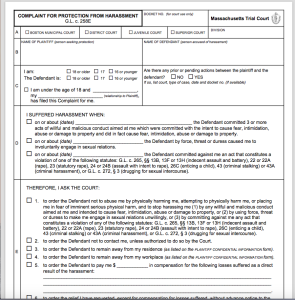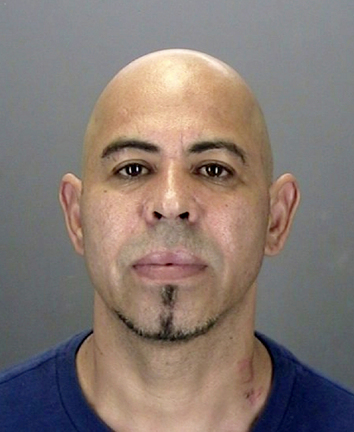Criminal defense lawyers in Massachusetts spend lots of time sitting in courtrooms waiting for their client’s cases to be called. The time is often occupied by conferencing cases with the assigned district attorney, reading the advance sheets and chatting with colleagues. Somedays, like today, I find myself watching and listening to the cases that are being heard before mine. One of these cases reinforced my strong belief that you need a lawyer for a restraining order hearing. Here is why. Continue Reading
Articles Posted in Restraining Orders
How Do I Fight to Vacate or Modify a 258E Harassment Prevention Order
To adequately show “harassment” to obtain a 258E harassment prevention order someone must convince a judge that the defendant has committed a minimum of three acts of “willful and malicious conduct” directed at someone “with the intent to cause fear, intimidation, abuse, damage to property” and that those acts do “in fact cause fear, intimidation, abuse to property”. Initially, the plaintiff will file a complaint for protection from harassment in the district court where he or she lives. A judge will review the papers and determine whether the order should issue temporarily or if a two party hearing should be held. Continue Reading
I Got Arrested Over The Weekend And I Need A Criminal Attorney, What Should I Do?
I never took the time to figure out what percentage of my clients gets arrested over the weekend but I am sure the number is significant. Several years ago, when I opened my own practice an older lawyer gave me some friendly advice. He told me that if possible, never schedule anything in court for Monday mornings. That advice has served me well over the years. Every weekend I get scores of telephone calls from people who got arrested, are in need of immediate legal assistance and getting arraigned on Monday. This past weekend was particularly busy. One of the messages I got from my answering service was “I got arrested over the weekend and I need a criminal attorney, what should I do?”. This article addresses that question.
209A Restraining Orders and The Suspension of Firearms and Firearm Licenses
Some people argue that the most onerous aspect of the Massachusetts restraining order statute is the requirement that firearms be surrendered. Massachusetts General Laws Chapter 209A Section 3B states that once a restraining order issues the defendant must immediately surrender all firearms. The law also requires the defendant to surrender all firearm licenses. Those licenses are automatically suspended as well. The defendant is notified of this consequence by the judge orally and in writing. The weapons are to be surrendered to the licensing authority where the defendant lives. Alternatively, the officer who serves the defendant with the 209A Order can take possession of the firearms at the time of service. Continue Reading
Charged With Domestic Assault and Battery in Massachusetts, What Should I Do?
One of the crimes most frequently defended by Massachusetts criminal lawyers is the case of domestic assault and battery. The statute prohibiting the conduct is Massachusetts General Laws Chapter 265 Section 13A. Not many people are aware that the crime of assault and battery in Massachusetts is a misdemeanor, punishable by up to two and one half years in the house of correction and a one thousand dollar fine. The term “domestic” does not change the actual criminal charge. Rather, it is a description commonly used by lawyers and lay people alike in reference to someone in a relationship causing physical harm to the other person in that relationship. Massachusetts judges and district attorneys for some reason seem to view assault and battery cases of this nature as being more serious than other assaultive conduct; i.e. a fist fight. For this very reason anyone charged with hitting or threatening a domestic partner should not go into court without a lawyer.
Why Are These Cases Taken So Seriously in Massachusetts?
The answer to this question is simple. The risk of harm to the victim coupled with the consequences facing the accused trigger great scrutiny of these cases. As to the victim, the prosecution and judges want to make sure that they are safe. Domestic issues are emotional issues and rationality often takes a backseat to reason and logic when emotions are tested. Ensuring that the complainant is safe from further attack is the first order of business. On the other hand, someone needs to protect the accused to make sure that his or her rights are protected as well. Domestic assault and battery allegations prompt the issuance of restraining orders. A violation of a restraining order can in some instances be a felony. For instance, an assault and battery in violation of a restraining order is a felony that can result in a five-year prison sentence. This again is reason enough for anyone charged with this crime to be represented by a lawyer.
What if I Didn’t Do Anything and the Complainant is Lying?
The sensitivity and volatility of domestic assault and battery cases usually leads judges, at least initially, to side with the complainant. No judge wants to see his or her name in the paper with an accusation that they did nothing to protect a “victim” in a domestic case. So, absent effective representation they will render harsh judgments against the accused in the form of restraining orders, pretrial detention and stiff sentences. An experienced criminal defense lawyer, properly prepared, will be able to demonstrate to the judge in appropriate circumstances that the accusations are lies. This can be done by getting witnesses to appear in court to refute the charges, show a pattern of lies in restraining order affidavits, reveal illicit motives for the duplicitous complaints and more. There is always a reason for making a false complaint of domestic abuse and a skilled defense lawyer will demonstrate this to the judge or jury. Aggressive defenses in these matters are often necessary and a quick start on your defense can save you the trouble of trying to vacate restrictions on your life at a later time.
Why Do People Lie In Domestic Abuse Cases?
There are many reasons people lie in domestic assault and battery cases. Sometimes people want to control their partner. If the complainant fears that the accused is planning to leave them a restraining order or complaint of domestic abuse gives them control during the pendency of the case. They can lie and tell the judge that the defendant violated the restraining order if the defendant does not do as they demand. Sometimes people wrongly believe that an accusation of domestic abuse will give them the upper hand in a divorce or child custody proceeding. Other times, abusing the courts with false claims of abuse is a way of “getting even” with a cheating spouse. Other times it is done out of pure evil. A good criminal defense lawyer will work with you to expose the “victim’s” illicit motives and get you a proper result in court.
Massachusetts Supreme Judicial Court Rules That Parent of Sixteen Year Old Cannot Stop Voluntary Sexual Relationship With an Adult
Today, in E.C.O. v. Compton, the Massachusetts Supreme Judicial Court published a decision addressing the Massachusetts Restraining Order Law as well as the age of consent for sexual activity in the Commonwealth. The facts of the case are as follows:
About a year and a half ago a sixteen year old girl from Massachusetts was traveling overseas with some family members. She met the defendant who was twenty four at the time. The girl lied about her age. After returning to Massachusetts the girl and the defendant maintained contact through email, texts and social media. The communications revealed a level of intimacy between the parties that contained sexual undertones. The defendant and the girl planned to meet in Massachusetts in October of 2011. There were discussions about sex and an express intention to spend time together in a hotel room. In preparation of that meeting the defendant rented a hotel room. Learning of this plan the girl’s father applied for a Restraining Order against the defendant. When the defendant arrived in Massachusetts he was served. The daughter never appeared in court. Her father did. He gave the judge copies of the electronic communications. The father conceded that the defendant never harmed or threatened the girl nor did he in any way coerce her to having sexual relations. The judge sitting in the Salem District Court extended the order for one year. The defendant appealed.
The Massachusetts Supreme Judicial Court reversed the order. In doing so it restated the standard for “abuse”, a necessary element for the issuance of a Restraining Order. In Massachusetts, the abuse necessary for a Restraining Order is defined as attempting to cause physical harm, causing physical harm, placing someone in fear of imminent serious physical harm or causing someone to engage in sexual relations. In this case the father agreed that the defendant did not harm his daughter nor did he attempt to do so. Furthermore, at not time did he force the girl to engage in involuntary sexual relations. Consequently the order should not have been extended. The Court reiterated that the age one can consent to having sex in Massachusetts is sixteen, the girl’s age at all relevant times.
It is clear that the plaintiff in this case, the girl’s father applied for the Restraining Order in an effort to keep his daughter from seeing the defendant. This action constitutes an improper use of the Massachusetts Restraining Order Statute. The statute was designed to prevent abuse, not to put a halt to relationships that parents find inappropriate. As a Massachusetts Criminal Lawyer it surprises me that this order issued in the first place. I imagine that the affidavit supporting the Restraining Order application referenced the intention of the defendant to supply the girl with alcohol, thus prompting the judge to issue the order to protect potential abuse.
Lawrence Massachusetts Man Arrested For Drug Trafficking, Gun Possession After Police Serve Restraining Order
Yesterday a Lawrence, Massachusetts police detective went to Miguel Francisco Acosta’s home on Myrtle Street to serve him with a Restraining Order. On the way there the detective was notified that Acosta had an outstanding warrant. When the officer and his backups arrived they were permitted entry by a female. Acosta was present. He was arrested. The police gave him the opportunity to get some pants on. They followed Acosta into the adjoining room and found a significant amount of Marijuana, Heroin, Drug Trafficking Paraphernalia and a Handgun. Acosta has been charged with Trafficking a Class A Substance, Possession With Intent to Distribute Marijuana, a School Zone Violation, Intimidation of a Witness, Unlawful Possession of a Firearm and Assault With a Dangerous Weapon. The case is currently pending in the Lawrence District Court however it is probable that the prosecution will end up in the Essex County Superior Court in Salem.
Read Article:
http://www.eagletribune.com/local/x1758586621/Lawrence-man-arrested-on-drug-assault-charges#
In preparing to defend this case Experienced Massachusetts Drug Defense Attorneys would investigate several facts. Did the woman who allowed the police to enter the home have the authority to do so? Was there a valid outstanding warrant to arrest Acosta? Did Acosta really invite the officer into the bedroom when he was putting on his pants? Who owned or rented the home? Who else stayed in the bedroom where the drugs were located? Did that person or people have a criminal record for drug offenses. Where in particular were the drugs located in the room? In a hidden place or in plain view? What about the Firearm? Where was that located? The answers to these questions might provide the basis for a viable defense to these charges. A proper defense might result in Acosta not having to serve the mandatory jail time associated with these crimes.
Boston Police Officer Involved In Incident Of Domestic Violence Charged With Domestic Assault And Battery
David Marchant, a Boston Police Officer living in Dorchester, Massachusetts is facing charges of Domestic Assault and Battery. The alleged victim is his wife. Boston.com reports that Marchant was arrested over the weekend. Marchant’s mother-in-law told officers that she witnessed Marchant slap his wife and push her. The mother-in-law tried to intercede. Marchant hit her too. She further stated that her she heard a slapping sound and then saw her daughter fall down some stairs. She then called 911. Marchant is on administrative duty at the police department while an investigation is conducted.
Read Article:
Boston Domestic Assault and Battery Defense Lawyer
Here are some interesting Domestic Violence statistics reported by the American Bar Association. There are about 1.3 million women and two thirds as many men assaulted by an intimate partner in this country each year. About thirty three percent of female murder victims are killed by an intimate partner. 84% of spousal abuse victims are female. These figures are staggering and only slightly representative of the actual incidents of Domestic Violence that occur each year.
Naturally, prosecutors in Massachusetts take these cases quite seriously. All Massachusetts District Attorney’s Offices have specially trained attorneys who prosecuted primarily Domestic Violence Cases. Additionally, Restraining Orders are often directly implicated in Domestic Violence prosecutions. This is why it is important that anyone charged with Domestic Assault and Battery in Massachusetts hire an Experienced Massachusetts Criminal Defense Lawyer. Without proper representation you risk a conviction or possible jail sentence.
Lawrence Man Arrested For Rape, Violating Restraining Order Against Former Girlfriend
This past Sunday Angel Ruiz of Lawrence, Massachusetts was arrested in the early morning hours. Authorities allege that Ruiz Raped and beat a woman with whom he had a relationship. Neighbors heard the woman screaming. Officers responding to the scene were informed that cut the woman and left the house. The woman was airlifted to a Boston hospital for treatment. The woman’s children were home at the time of the attack. Ruiz has been charged with Violation of a Restraining Order, Aggravated Rape, Assault and Battery, Larceny and Intimidation of a Witness. The case will be prosecuted in the Essex County Superior Court in Salem. The victim was released from the hospital.
Read Article:
http://www.eagletribune.com/local/x1388784548/Man-charged-in-violent-rape
Massachusetts Rape Defense Lawyers
Ruiz is facing a big fight. These charges are severe. The Rape charge carries a maximum sentence of life pursuant to Massachusetts General Laws Chapter 265 Section 22(a). This is the more severe Rape Charge, commonly referred to as Aggravated Rape. The district attorney will have to prove not only non-consensual sex but also that the act resulted in serious bodily injury. That aspect of the law might appear satisfied by the fact that the victim was cut and that her injuries necessitated hospitalization. If the prosecutor cannot meet its burden as to the aggravated portion of the offense then there is a maximum twenty year sentence for a conviction of this crime. Either way, if this article is factually accurate Ruiz is facing a lengthy state prison sentence if his is convicted. As with any serious case in this jurisdiction, Ruiz needs to Hire an Experienced Massachusetts Rape Defense Lawyer.
Bridgewater Man Charged In Lynn With Domestic Assault On Ex Girlfriend
 Michael Holyoke of Bridgewater, Massachusetts is facing several charges involving an alleged incident of Domestic Violence against his former girlfriend. The Lynn Item reports that the woman’s neighbor contacted police after hearing a man and woman fighting with one another. The woman also asked the neighbor for help. When the police arrived the two were still verbally fighting. The woman reported to the police that Holyoke punched her in the head several times and threw her into glass shower doors in the bathroom. He then blocked her escape route and smashed her cell phone after she tried to call the police. It was also reported that the victim stabbed Holyoke in the face and neck with a steak knife. Holyoke has been charged with Kidnapping, Intimidation of a Witness, Domestic Assault and Battery and Possession of a Class C Drug. The case is pending in the Lynn District Court. The case might be prosecuted in Salem in the Essex County Superior Court. The woman had previously taken a Restraining Order out against Holyoke.
Michael Holyoke of Bridgewater, Massachusetts is facing several charges involving an alleged incident of Domestic Violence against his former girlfriend. The Lynn Item reports that the woman’s neighbor contacted police after hearing a man and woman fighting with one another. The woman also asked the neighbor for help. When the police arrived the two were still verbally fighting. The woman reported to the police that Holyoke punched her in the head several times and threw her into glass shower doors in the bathroom. He then blocked her escape route and smashed her cell phone after she tried to call the police. It was also reported that the victim stabbed Holyoke in the face and neck with a steak knife. Holyoke has been charged with Kidnapping, Intimidation of a Witness, Domestic Assault and Battery and Possession of a Class C Drug. The case is pending in the Lynn District Court. The case might be prosecuted in Salem in the Essex County Superior Court. The woman had previously taken a Restraining Order out against Holyoke.
Read Article:
Massachusetts Domestic Violence Defense Lawyer
This appears to be one of those cases that will remain in the District Court. Even though the charges are serious cases of this nature only get prosecuted in the Supeior Court if there was substantial physical harm to the victim or if the defendant has a lengthy criminal record and presents a serious danger to the victim or the community. The bail in this case, five hundred dollars suggests the strong possibility that the prosecution will continue in the Lynn District Court. Stab wounds suffered by the defendant might have an impact on Holyoke’s Massachusetts Criminal Lawyer’s approach to defending this case. That evidence might also be indicative of who actually was the first aggressor.
 Massachusetts Criminal Defense Attorney Blog
Massachusetts Criminal Defense Attorney Blog






